Kaja Kallas facts for kids
Quick facts for kids
Kaja Kallas
|
|
|---|---|
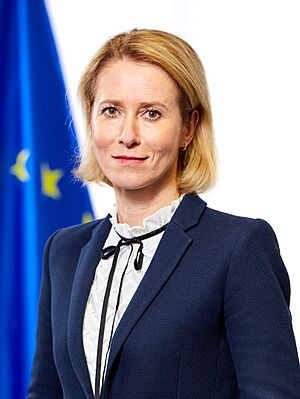
Official portrait, 2024
|
|
| Vice-President of the European Commission | |
| Assumed office 1 December 2024 |
|
| President | Ursula von der Leyen |
| Preceded by | Josep Borrell |
| High Representative of the European Union for Foreign Affairs and Security Policy | |
| Assumed office 1 December 2024 |
|
| President | Ursula von der Leyen |
| Preceded by | Josep Borrell |
| 19th Prime Minister of Estonia | |
| In office 26 January 2021 – 23 July 2024 |
|
| President | |
| Preceded by | Jüri Ratas |
| Succeeded by | Kristen Michal |
| Leader of the Estonian Reform Party | |
| In office 14 April 2018 – 8 September 2024 |
|
| Preceded by | Hanno Pevkur |
| Succeeded by | Kristen Michal |
| Member of the Riigikogu | |
| In office 3 March 2019 – 26 January 2021 |
|
| Constituency | Harju–Rapla |
| In office 6 March 2011 – 1 July 2014 |
|
| Constituency | Harju–Rapla |
| Member of the European Parliament for Estonia | |
| In office 1 July 2014 – 5 September 2018 |
|
| Personal details | |
| Born | 18 June 1977 Tallinn, Estonia |
| Political party | Estonian Reform Party (2010–present) |
| Spouses |
Roomet Leiger
(m. 2002; div. 2006)Arvo Hallik
(m. 2018) |
| Domestic partner | Taavi Veskimägi (2011–2014) |
| Children | 1 |
| Parents | Siim Kallas (father) Kristi Kallas (mother) |
| Relatives | Eduard Alver (great-grandfather) |
| Education |
|
Kaja Kallas (born 18 June 1977) is an Estonian politician and diplomat. She made history as the first female Prime Minister of Estonia, serving from 2021 to 2024. In 2024, she took on two important roles: High Representative of the European Union for Foreign Affairs and Security Policy and Vice-President of the European Commission.
Kallas has been the leader of the Estonian Reform Party since 2018. Before becoming prime minister, she was a member of the Estonian Parliament (called the Riigikogu) from 2011 to 2014 and again from 2019 to 2021. She also served as a member of the European Parliament from 2014 to 2018. Before her political career, Kaja Kallas worked as a lawyer, specializing in European competition law.
Contents
Early Life and Education
Kaja Kallas was born in Tallinn, Estonia, on 18 June 1977. Her father, Siim Kallas, was also a well-known politician. He served as the head of the Bank of Estonia, prime minister, and a European Commissioner. Her mother, Kristi Kallas, is a doctor.
Kaja Kallas's family has a unique history. Her mother, grandmother, and great-grandmother were sent to Siberia when her mother was just six months old. This happened during the Soviet mass deportations in March 1949. Her mother was able to return to Estonia in 1959.
Kallas studied law at the University of Tartu, graduating in 1999. She later earned an Executive Master of Business Administration (EMBA) from the Estonian Business School in 2010.
Professional Background
Before entering politics, Kaja Kallas had a successful career as a lawyer. She became a member of the Estonian Bar Association in 1999. She worked at several law firms, focusing on competition law. From 2008 to 2011, she led the competition law department at a major law firm.
Kallas also served on the boards of various companies, including those involved in wind power. She was a board member of the Estonian Wind Power Association from 2009 to 2010.
Political Journey
Member of Estonian Parliament (2011–2014)
Kaja Kallas joined the Estonian Reform Party in 2010. In 2011, she was elected to the Riigikogu, Estonia's parliament. She represented the Harju County and Rapla County area. During this time, she chaired the Economic Affairs Committee, focusing on important economic issues for the country.
Member of European Parliament (2014–2018)
In 2014, Kallas was elected to the European Parliament. There, she worked on committees related to industry, research, energy, and consumer protection. She was also involved in relations with Ukraine and the United States.
Kallas was a strong supporter of the Digital Single Market strategy. She believed that digital borders should not stop new companies from growing. She also focused on energy and consumer policies. She was recognized as one of the most influential members of the European Parliament, especially for her understanding of technology.
Leading the Reform Party (2017–2020)
In 2017, Kaja Kallas was asked to run for the leadership of the Reform Party. She accepted and won the election in April 2018. This made her the first woman to lead a major political party in Estonia.
In the 2019 parliamentary election, her party received the most votes. However, another party formed a government, and the Reform Party became the main opposition. Kallas was re-elected as the party leader in 2020.
Prime Minister of Estonia (2021–2024)

On 25 January 2021, Kaja Kallas became the Prime Minister of Estonia. She formed a coalition government, making her the first female prime minister in Estonia's history.
As prime minister, Kallas played a significant role in international affairs. She spoke out against Russia's actions in Ukraine. She emphasized that countries should not be pressured about joining organizations like the European Union or NATO.
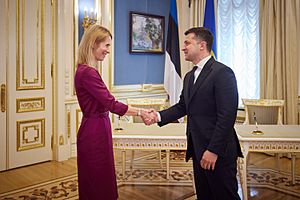
Estonia faced an energy crisis in 2021. Kallas initially focused on long-term solutions rather than immediate aid. She explained that high energy prices were due to natural gas costs and the conflict in Ukraine. In January 2022, her government announced a plan to help reduce energy costs.
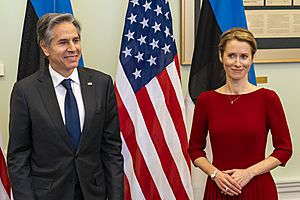
Before the full-scale conflict in Ukraine began in February 2022, Kallas called for the Nord Stream 2 pipeline to be stopped. She also highlighted Europe's reliance on Russian natural gas as a problem. Estonia, under her leadership, sent military aid to Ukraine. Kallas was praised for her strong stance and leadership during this time. Her approval ratings in Estonia increased significantly.

After the conflict started, Estonia, along with other allies, activated Article 4 of NATO. Kallas pledged strong support for Ukraine. Estonia provided a large amount of military equipment to Ukraine compared to its size. Kallas became known internationally as a leading voice supporting Ukraine. She also strongly supported Ukraine joining the European Union.
In June 2022, Kallas formed a new coalition government. She continued to lead efforts to support Ukraine. In September 2022, she stated that travel to the European Union is a privilege, not a human right, especially for citizens of a country involved in aggression. She also said that Estonia would not grant asylum to Russian men avoiding military service, stating that citizens are responsible for their state's actions.
In March 2023, Kallas led the Reform Party to another victory in the parliamentary election. Her third government was sworn in on 17 April 2023. In June 2023, her government passed a law legalizing same-sex marriage and adoption in Estonia, which took effect on 1 January 2024.
She also supported removing Soviet-era monuments that glorified the Communist regime. She believed that public displays should not support or justify acts of aggression or war crimes.
High Representative of the Union for Foreign Affairs and Security Policy (2024–present)
On 28 June 2024, Kaja Kallas was nominated for a very important role: High Representative of the Union for Foreign Affairs and Security Policy. This means she is now the top diplomat for the European Union. She also became Vice-President of the European Commission. She officially started these roles on 1 December 2024.
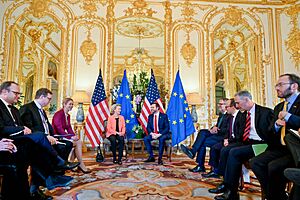
On her first day in office, Kallas visited Ukraine, showing strong support for Ukraine's victory. She also warned the government of Georgia not to use violence against ongoing protests, threatening possible actions.
In December 2024, she welcomed the fall of the Assad regime in Syria, saying it showed that "Russia is not invincible." She also called for stronger cooperation between the EU and Turkey, recognizing Turkey's importance as a NATO ally.
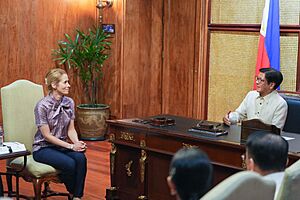
In February 2025, Kallas continued to speak about international relations. She stated that China's support was crucial for Russia's military actions in Ukraine. She also expressed doubts about peace talks that might give too much to an aggressor.
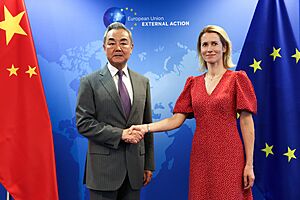
In July 2025, Kallas met with Chinese Foreign Minister Wang Yi. She also participated in discussions where EU foreign ministers decided not to take action against Israel regarding certain issues.
Personal Life
Kaja Kallas has one son. In 2018, she married Arvo Hallik, a banker. He has two children from a previous relationship.
Besides her native Estonian, Kallas is fluent in English, Finnish, Russian, and French. She enjoys reading history books and is friends with several historians.
Honours and Awards
State Decorations
 Grand Cross of the Order of the Star of Romania (2021)
Grand Cross of the Order of the Star of Romania (2021) Commander Grand Cross of the Royal Order of the Polar Star (Sweden, 2023)
Commander Grand Cross of the Royal Order of the Polar Star (Sweden, 2023) Order of Prince Yaroslav the Wise, 2nd class (Ukraine, 2023)
Order of Prince Yaroslav the Wise, 2nd class (Ukraine, 2023)
Awards and Prizes
- Transatlantic Leadership Award (2022)
- Grotius Prize (2022)
- European Prize for Political Culture (2022)
- International Prize from the Friedrich August von Hayek Foundation (2022)
- Jeane J. Kirkpatrick Award (2023)
- Marion Dönhoff Prize for International Understanding and Reconciliation (2023)
- International Lord Byron Prize (2023)
- Walther Rathenau Award (2024)
Other Activities
Kaja Kallas is involved in many organizations. She is a member of the Board of Trustees of the Friends of Europe and the European Council on Foreign Relations. She also serves as an advisory board member for the Women Economic Forum. Kallas is a mentor for the European Liberal Youth and an ambassador for programs like Erasmus for Young Entrepreneurs. She is also part of groups like Women Political Leaders.
See also
 In Spanish: Kaja Kallas para niños
In Spanish: Kaja Kallas para niños
 | Percy Lavon Julian |
 | Katherine Johnson |
 | George Washington Carver |
 | Annie Easley |

